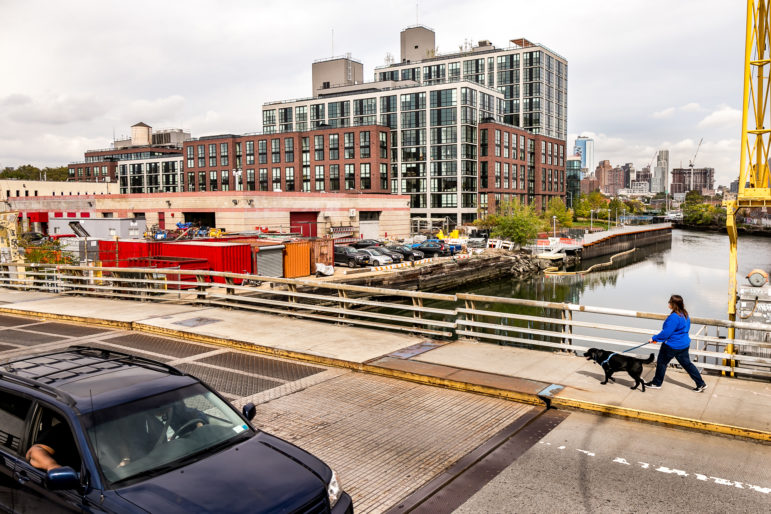
Adi Talwar
The view from the 3rd Street bridge over the Gowanus Canal.The city officially kicked off public review Monday for its much-debated proposal to rezone an 82-block swath of Gowanus, Brooklyn, a process that’s been delayed for months due to a lawsuit filed earlier this year by community groups challenging the city’s decision to hold virtual public hearings on the plan.
State Supreme Court Judge Katherine Levine on Monday lifted a temporary restraining order that had been in place since January, allowing the city to move forward with public review as long as officials submit detailed plans to the court for hosting an outdoor public hearing on the rezoning. Voice of Gowanus, the main community group that filed the lawsuit delaying the city’s efforts, has argued that the use of remote meetings—instituted as part of the city’s COVID-19 safety measures—are not as accessible as in-person public events.
Following the court’s decision, the City Planning Commission on Monday afternoon certified the rezoning proposal—known as the Gowanus Neighborhood Plan—a move that starts the clock on the the city’s step-by-step public review process known as the Uniform Land Use Review Procedure, or ULURP. Brooklyn Community Boards 2 and 6 are required to hold public meetings on the plan within the next 60 days; after that, the proposal will go to the Brooklyn Borough President and borough board for review before being put up for a vote by the City Planning Commission and the City Council.
The city has proposed rezoning a large portion of the Brooklyn neighborhood—bound by Bond Street to the west, Baltic Street to the north, 4th Avenue to the east, and Huntington, 3rd, 7th and 15th streets to the south—to create more housing. Officials say the changes would allow for the addition of 8,500 new apartments, about 3,000 of them affordable (950 affordable units would be built on a city-owned site known as Public Place or Gowanus Green, and the rest would be created under the city’s Mandatory Inclusionary Housing program, which requires new developments set aside a portion of units for affordable housing).
The de Blasio administration and other supporters of the plan say it’s an opportunity to being bring badly-needed affordable housing, as well as jobs and new green spaces, to a neighborhood that’s home to higher-income residents than past city rezonings, which critics argue have mainly targeted lower income communities of color. On Monday, City Planning Commissioner Marisa Lago hailed the Gowanus proposal as “a giant step closer to building an inclusive, healthy, more equitable and green future for this one-time industrial hub.”
“The Gowanus plan is an antidote to the status quo, a status quo that has long put wealthy, amenity-rich neighborhoods under glass and out-of-reach for too many New Yorkers,” Lago said.
But Voice of Gowanus and others who oppose the rezoning proposal have disputed the city’s characterization of Gowanus as a largely white, wealthier neighborhood. They’ve also voiced concerns about the environmental impact of building new housing—which the city says could bring an additional 20,000 residents to the area—around the long-polluted Gowanus Canal, a federal Superfund site where remediation just began in December and won’t wrap up until at least 2030 (the city, for its part, says the rezoning will require site clean-ups before new development can be built, and also points to new stormwater management rules aimed at reducing sewage overflow into the canal.) Some stakeholders have also argued that Gowanus Green/Public Place, where the city wants to build six new affordable apartment buildings, should be maintained as open green space (the city has proposed creating a 1.5 acre park as part of its plans to develop the approximately 6-acre site).
In a statement, Voice of Gowanus said Monday that it plans to “review the full range of legal options” in its ongoing lawsuit against the city.
“The court proceeding continues, and Voice of Gowanus will not waver in its fight on behalf of the community to ensure there is increased public participation, access and transparency at any ULURP public hearings on the massive and controversial Gowanus rezoning plan,” Jason Zakai, an attorney for the group, said in a statement.
The Gowanus Neigborhood Plan is one of two city-initiated rezonings that the de Blasio administration seeks to pass before the mayor leaves office at the end of the year; the other is being proposed for SoHo/NoHo in Manhattan.










One thought on “Public Review Kicks Off for Gowanus Rezoning Following Lawsuit Delays”
Looking at the photo shown here, of the spot rezoned site that the previous councilman deDlassio pushed through, one should note that the current rezoning would allow an additional 10-stories in height over the tallest building pictured which is 12-stories, for a total of 22-stories along the side of the canal.
The 22-30 stories proposed by the rezoning is the dead give-a-way that this is a 100% developer driven proposal, for developers who will never live here but expect good profits.
We should expect such actions would make the Gowanus more of a sewage filled gully, at least until the time the sea overtakes the land –something already taking place with the rising local water table.